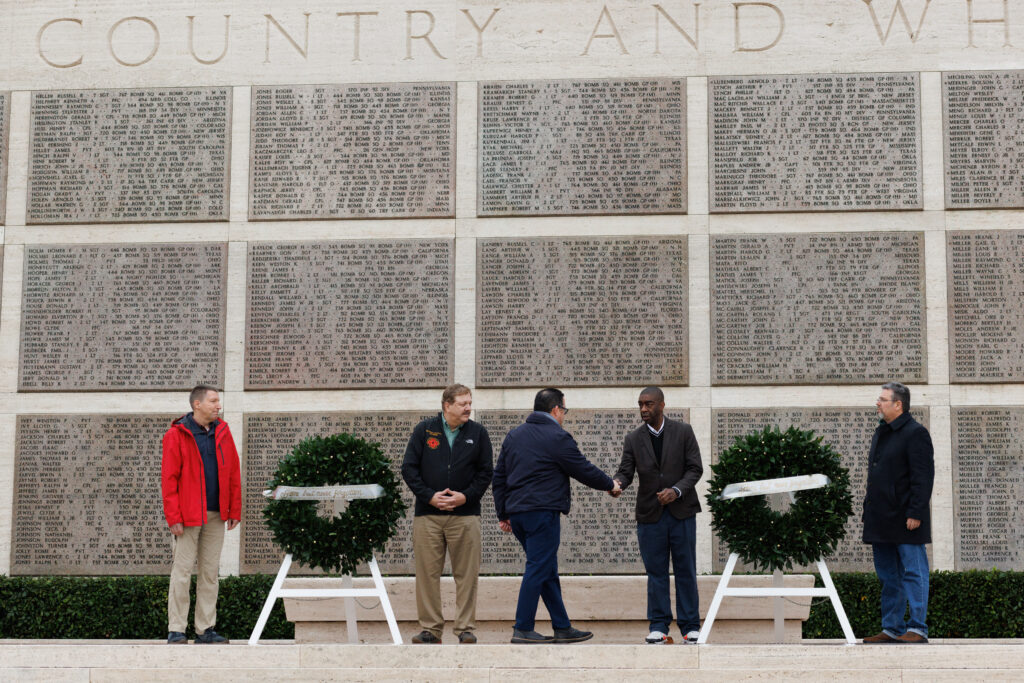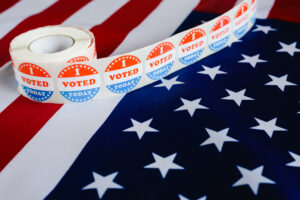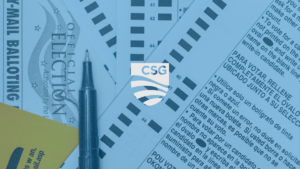
The Overseas Voting Initiative (OVI) traveled to Italy in December 2022 to gain a better understanding of the challenges that Americans living overseas face when voting from abroad.
The first day of meetings in Venice kicked off with Denise Tecchio from American Corners based in Trieste, Italy. American Corners, or American Spaces, are supported by the U.S. Department of State and provide cultural programs and events for foreign citizens. In addition to providing English language classes, a maker space for doing crafts and DIY projects and a ukulele club to sing English songs, Ms. Tecchio’s group assists American citizens with information on elections and voting. American Corners in Triste coordinates with the U.S. Embassy in Milan to help voters send their ballots by diplomatic post. The OVI group had a good conversation with Ms. Tecchio about the barriers to voting in primaries, which is not just a problem faced by overseas citizens, but a nationwide turnout problem.
Upon arrival in Florence the following day, the group traveled to the Florence American Cemetery and Memorial, containing the headstones of 4,392 Americans who died defending freedom during World War II in Italy. The group heard from an American citizen who is the superintendent of the facility, which is owned by the U.S. government, about the history of the war effort in Italy. Election Assistance Commission Chair Thomas Hicks and Commissioner Donald Palmer, recently retired Vermont Secretary of State Jim Condos and Federal Voting Assistance Program (FVAP) Director Scott Wiedmann laid wreaths at the memorial.
The next day’s meetings began with information on FVAP’s Ambassador program. Developed over the last several years, the program engages expatriate Americans living in a country to act as liaisons to help U.S. citizens vote. Ambassadors are currently located in Italy, Germany and the United Kingdom. Italy’s FVAP Ambassador, Sean Greene, told the group that the most common question he gets are about a voter’s residency and which address to use when voting. He also received many practical questions, like how to provide the embassy a ballot to include in the diplomatic pouch, how to fold an FVAP-provided DYI envelope and whom to contact with questions. Mr. Greene noted that during the pandemic it was more difficult to engage voters, but he was able to engage overseas citizens online through social media and Zoom Q&A sessions facilitated by the embassy and consulates. Going forward, Mr. Greene suggested that FVAP could have regional ambassadors who set up virtual office hours and conduct much of their outreach online.
The afternoon session in Florence and morning session in Rome featured discussions with expatriates about the barriers they face in returning ballots from abroad. Of note, these discussions highlighted that Europe has stronger privacy laws than we are accustomed to in the United States, making it difficult to identify and track U.S. citizens living abroad. This can make it hard to reach these citizens to inform them of their right to vote and how to cast a ballot. It can also take a long time for mail to travel from abroad to the United States, and there is sometimes a lack of trust in the local mail system, particularly in Italy.
Another barrier is simply understanding the system. Expatriates don’t always realize that getting a ballot is a multi-step process that requires a citizen to first register to vote and then request a ballot, or that the Federal Post Card Application (FPCA) in most states achieves both of these requests. Additionally, depending on their state of residency, voters may have to request a ballot each calendar year. There is also a misunderstanding about “intent to return,” the question that classifies overseas citizens as living permanently overseas or temporarily overseas, which affects the type of ballot voters are eligible to receive in some states. Often, U.S. citizens living abroad aren’t sure whether or not they will return to the U.S. and they have difficulty answering the question. They may also worry about tax implications, both in the U.S. and in their current country of residence, depending on how they answer the question.
The final activity of the group was a highlight for many – a visit to the U.S. Embassy in Rome and a tour of the mail facilities. The Embassy in Rome and other U.S. Overseas Missions (embassies and consulates) provide secure collection boxes for U.S. citizens to return their ballots during federal elections. Ballots are sent to the U.S. via an unclassified diplomatic pouch, through the Diplomatic Post Office (DPO). Diplomatic pouches containing ballots and other unclassified mail are sent first to a sorting facility in Dulles, Virginia, and then put into the U.S. mail stream. This process has important implications for election officials because many states permit ballots from military and overseas voters to be counted if they are received after election day but postmarked beforehand. The issue of how they are postmarked when received at a U.S. embassy and when they are received at the Dulles sorting facility thus may affect whether the ballot is ultimately counted or not.
The ability for overseas citizens to track their ballots through the system is another area of concern for those living abroad. Engaged voters like to be informed of when their ballot arrives in the U.S., is in the hands of election officials and is ultimately counted. Using the DPO system described above, State Department employees and their eligible family members can track their ballots, but expatriates not associated with the State Department don’t have tracking capabilities.
The conversations and many lessons learned from the trip to Italy will help inform the work of the OVI in the coming years, with a particular focus on understanding the unique barriers of private, non-military citizens living overseas.
The post Voting Abroad: Lessons and Takeaways from Italy 2022 appeared first on CSG OVI.





